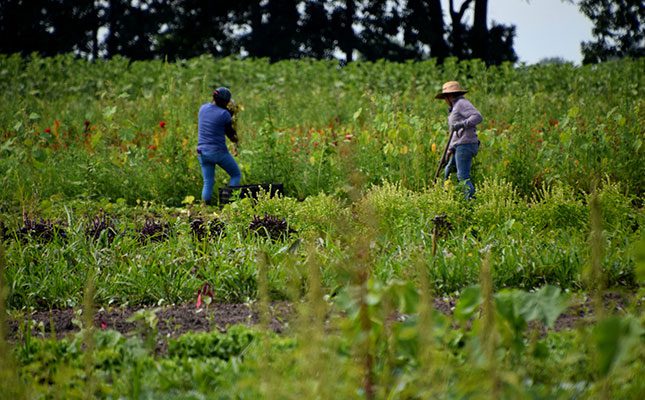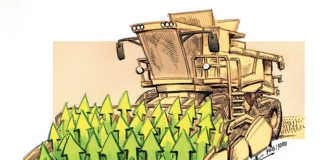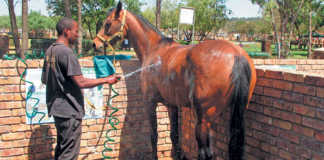
Photo: Flickr
An accident is an unfortunate incident that happens unexpectedly and unintentionally, typically resulting in damage or injury, but fortunately not always.
Sometimes minor accidents serve as a warning of what can happen as a result of negligence or failure to take action to minimise risks. As the saying goes, some situations are accidents just waiting to happen.
Statistics about farm accidents are quite frightening, so farmers should perhaps spend more time thinking about what can go wrong, because farms are dangerous workplaces.
You’re dealing with animals that move randomly, are difficult to control and often big and aggressive when spooked; heavy machines that can’t be easily stopped; chemicals that have effects on health; and manual labour that’s tough on muscles and joints, particularly if you’re getting on in age.
Additionally, farming is one of the few lines of work where living and employment conditions are mixed; in addition to agriculture workers, family members living on the farm are at risk for fatal and non-fatal injuries including amputation, loss of skin and tissue, severe burns, deafness, blindness and other bodily mutilation.
Information is scarce in South Africa but, globally, at least 170 000 agriculture workers die as a result of accidents. In the US, 60 to 70 per 100 000 farmers are killed annually, while non-fatal injuries occur to about 33% of the farming population, with 3% of accidents resulting in a permanent disability.
Part-time workers employed in farming are not always included in these figures; neither is the economic impact of trauma and lost time. According to Wilson, Kehoe and Winningham (WKW) injury attorneys in the US, farming accidents are common, yet preventable most of the time.
How to cut risks
- Develop a safety checklist: Maintain the farm property and equipment. Walk through the farm and make a list of equipment, platforms, handrails and pathways that need attention. Repair and replace equipment and structures as needed.
- Have a safety and emergency plan: Create a list of important safety checks. Construct a communication plan and step-by-step protocol for what to do in the case of an emergency. Make sure everyone understands it.
- Train all employees properly: read all manuals frequently, and have employees review how to use machinery by reading the manuals as well. If workers are not properly trained to use equipment, they should not be using it. If workers are not properly trained to use chemicals and other farming products, they should not be doing so. Many farming accidents are avoidable. In fact, 80% of farm accidents result from carelessness or failure to deal with hazards safely. Never allow anyone on farming equipment without proper training and prior supervision, and teach all employees about the dangers of toxic chemicals. Review the types and causes of farming accidents and how to prevent them with employees.
- Stay up to date on farming laws and requirements: become familiar with requirements of the code and recommendations regarding occupational safety and health and be aware of the types and causes of farming accidents. Research and understand the common types and causes of farming accidents.
Defective equipment
Defective farming equipment is a huge issue in the agriculture sector. For example, tractor accidents are the leading cause of injuries and deaths for farmworkers. The most common types of tractor accidents include:
- Rollovers: Many farmers have been injured or killed due to tractor rollovers during use.
- Entanglement: Farmworkers get seriously maimed, disfigured, or killed due to becoming entangled in farm equipment.
- Getting run over by a tractor: Farmworkers have been seriously injured or killed due to being thrown off the equipment and run over.
- Sometimes these types of accidents occur due to defective or dangerous equipment, and the farm equipment company can be held liable.
Other types of defective or dangerous farming equipment include bush hogs, hay rakes, hay balers, augers and grain bins.
Failure to provide mandatory labels or warnings on equipment is another major cause of farming accidents. Legally, all dangerous chemicals must be identified and properly labelled, and farming equipment must contain adequate warnings.
If someone is injured or killed due to a missing product label or equipment warning, the product company or farm employer could be held responsible, according to WKW.
Workers often fall from farm structures or equipment. In addition, many farmworkers have been crushed to death as a result of unstable farm structures or equipment.
If someone is killed due to falling or being crushed, the farm employer, product manufacturer, or other farm employees may be at fault. Working on wind pumps requires harnesses and helmets.
Suffocation
Anywhere grain is stored, such as a grain bin or silo, can have micrograins in the air, which can affect breathing and even cause suffocation. Death due to suffocation can happen inside grain silos.
Don’t forget burns
Burns are an ever-present danger on a farm. They can be life-altering and lead to major pain and permanent disfigurement. Burns could even lead to longer-lasting issues, such as loss of sensation and impacts on mental health. So be very careful around fires and flammable substances.
Common sense is the magic word. Safe livestock farming requires safe yards with secure fencing and gates that don’t fly open when under pressure from animals. In shearing sheds, non-slip floors are essential.
Livestock often weigh a massive amount, meaning even seemingly small actions can have a large impact. You don’t want to be trampled by a herd of cattle or struck in the back by a big ram. A back kick from a startled horse can result in broken bones and internal bleeding.
Bacterial infections from animal bites need to be taken care of right away, or else sepsis may occur. Get medical treatment immediately after an animal injury.










